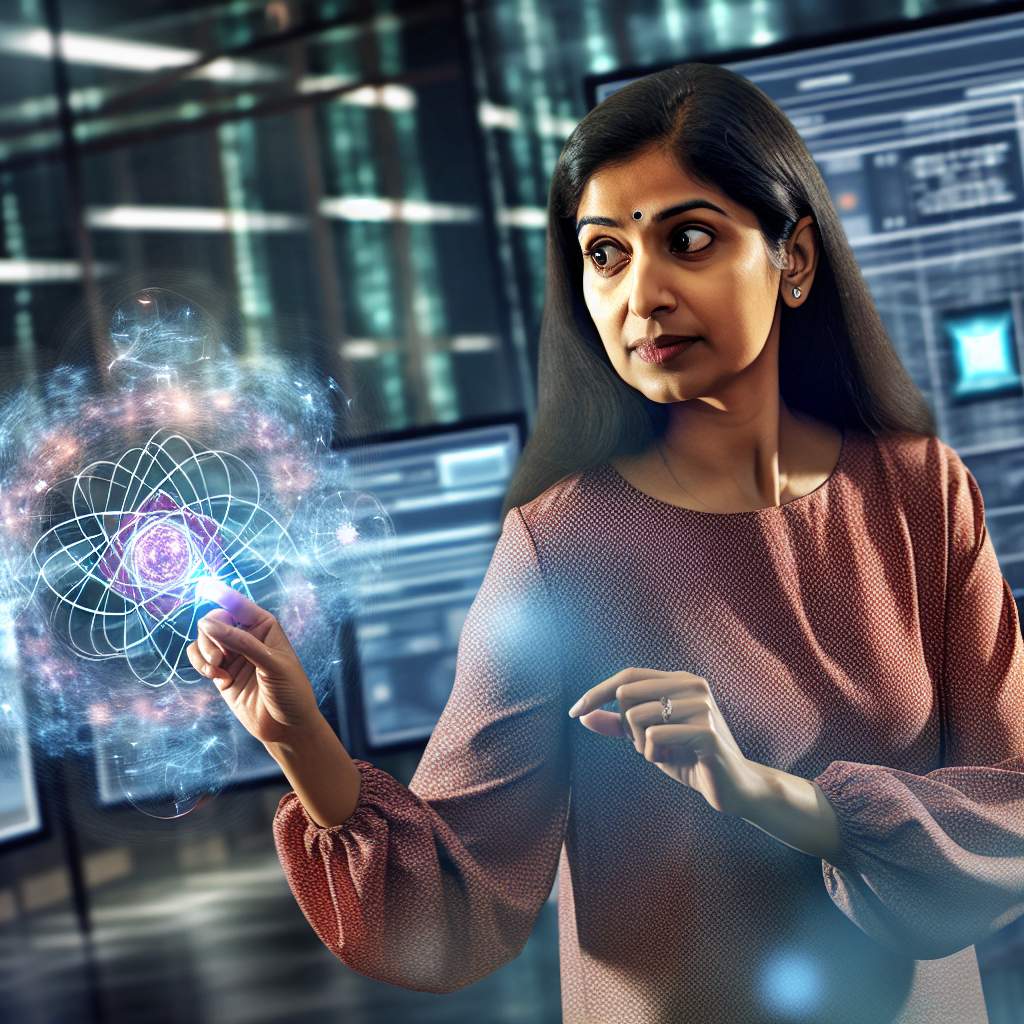Introduction
Let’s explore AI-driven enhancements in blockchain development platforms
Definition of AI and Blockchain
Artificial Intelligence (AI) involves creating software that can perform tasks that typically require human intelligence.
This includes problem-solving, understanding natural language, and learning from data.
Blockchain, on the other hand, is a decentralized and distributed ledger technology that ensures secure and transparent transactions.
Brief overview of the convergence between AI and blockchain technologies
The convergence of AI and blockchain technologies offers innovative solutions.
Both technologies complement each other, enhancing their respective capabilities.
AI analyzes vast amounts of data, while blockchain secures that data with its immutable structure.
Together, they can solve complex problems in various industries.
Importance of exploring AI-driven enhancements in blockchain development platforms
Exploring AI-driven enhancements within blockchain development platforms is crucial.
These enhancements streamline processes and improve efficiency.
As businesses seek to harness AI capabilities, they increasingly turn to blockchain for data integrity and security.
The combination enables organizations to build more robust applications.
AI enhances blockchain development by automating processes.
Developers can leverage machine learning algorithms to optimize the coding process.
This reduces development time and minimizes human error.
Furthermore, AI can help identify vulnerabilities within smart contracts, ensuring higher security levels.
Integrating AI can improve decision-making in blockchain environments.
For instance, predictive analytics can forecast trends based on historical data.
This capability allows businesses to make informed decisions quickly.
The fusion of AI’s analytical power with blockchain’s transparency yields greater operational insights.
Additionally, AI can help manage blockchain networks efficiently.
Machine learning can optimize resource allocation, leading to better performance.
This capability ensures nodes function optimally, maintaining the network’s stability.
A well-functioning network is essential for the smooth execution of transactions.
In summary, the intersection of AI and blockchain presents exciting prospects.
Enhancements driven by AI can significantly elevate blockchain development platforms.
This convergence not only improves efficiency but also fosters innovation across diverse sectors.
Understanding Blockchain Development Platforms
Blockchain development platforms serve as the infrastructure for creating decentralized applications and smart contracts.
They allow developers to build, test, and deploy blockchain solutions efficiently.
These platforms offer a range of tools, libraries, and frameworks, making blockchain accessible for a variety of projects.
What are Blockchain Development Platforms?
A blockchain development platform provides an environment for developers to create applications that operate on a blockchain.
These platforms simplify the complexity of working with blockchain technology.
They enable the creation of various decentralized applications (dApps), enhancing transparency and reducing the need for intermediaries.
These platforms often come with software development kits (SDKs), application programming interfaces (APIs), and integrated development environments (IDEs).
By providing these tools, they accelerate the development cycle.
We Design & Develop Websites, Android & iOS Apps
Looking to transform your digital presence? We specialize in creating stunning websites and powerful mobile apps for Android and iOS. Let us bring your vision to life with innovative, tailored solutions!
Get Started TodayDevelopers can focus on building unique features instead of dealing with intricate blockchain protocols.
Examples of Popular Blockchain Platforms
Several blockchain development platforms have emerged as leaders in the industry.
Each offers unique features that cater to different use cases.
Here are some popular platforms:
- Ethereum: Known for its smart contract capabilities, Ethereum remains one of the largest platforms by market capitalization.
- Hyperledger: A project under the Linux Foundation, Hyperledger provides frameworks for building permissioned blockchain solutions.
- Binance Smart Chain: This platform focuses on fast transactions with low fees and supports the Ethereum Virtual Machine (EVM).
- Cardano: Built on a research-driven approach, Cardano emphasizes scalability, sustainability, and interoperability.
- Solana: Known for its high throughput, Solana supports rapid transaction speeds and low costs, appealing to developers.
Key Features and Components of Blockchain Development Platforms
Blockchain development platforms come equipped with key features and components that enhance their functionality and usability.
Here are some essential characteristics:
- Smart Contract Support: Most platforms allow for the deployment of smart contracts, automating processes through code.
- Interoperability: Many platforms enable interaction with different blockchains, enhancing versatility in application development.
- Scalability: Effective platforms offer solutions that can handle an increasing number of transactions without compromising performance.
- Security Features: Security protocols, including cryptographic methods, help protect data and transactions on the blockchain.
- Developer Tools: Comprehensive SDKs, APIs, and IDEs support developers in building and deploying their applications.
- Governance Mechanisms: Certain platforms incorporate governance models, allowing community input on the platform’s future direction.
- Consensus Algorithms: Different platforms use various consensus mechanisms, such as Proof of Stake or Proof of Work, for transaction validation.
By understanding these features and components, developers can select the most appropriate blockchain platform for their project.
Each platform comes with its strengths and weaknesses, making informed choices essential.
With the rise of artificial intelligence, the synergy between AI and blockchain is beginning to transform how development platforms operate.
AI enhances the capabilities of these platforms, enabling more robust, efficient, and innovative solutions.
The Role of AI in Blockchain Development
AI technologies integrate seamlessly into blockchain development platforms.
This combination facilitates enhanced capabilities and optimizes processes at multiple levels.
Here are some significant roles that AI plays:
- Automated Testing: AI tools can automate testing processes, improving reliability and speed during development.
- Smart Contract Auditing: AI algorithms can analyze smart contracts for vulnerabilities, ensuring they are secure before deployment.
- Data Analysis: AI can analyze vast amounts of blockchain data to generate insights and support data-driven decisions.
- Predictive Modeling: With predictive analytics, AI can forecast trends within blockchain ecosystems, benefiting decision-making processes.
- User Behavior Analysis: AI can track user interactions on dApps, helping developers understand and enhance user experiences.
These applications of AI not only enhance the efficiency of blockchain development but also contribute to a more secure and user-friendly environment.
As developers utilize these AI-driven enhancements, they become better equipped to tackle complex challenges.
The Future of Blockchain Development Platforms
The intersection of AI and blockchain development platforms signifies a turning point in how applications are built and maintained.
As platforms continue to evolve, integrating AI technologies will become vital for development efficiency.
Understanding the core functionalities of blockchain platforms will empower developers to build with confidence.
As AI continues to enhance these capabilities, the potential for innovative applications within the blockchain space will only grow.
This evolution not only benefits developers but also users seeking transparent, efficient, and secure solutions.
All in all, the ongoing advancements in blockchain development platforms, fueled by AI, promise a future filled with endless possibilities.
Developers must stay informed about these changes to leverage their full potential and contribute to the expanding blockchain ecosystem.
Read: Optimizing Blockchain Performance with Cloud-Based Solutions
The Role of Artificial Intelligence in Blockchain
As blockchain technology evolves, the integration of artificial intelligence (AI) becomes increasingly vital.
Various AI technologies enhance the functionality and efficiency of blockchain platforms.
These technologies include machine learning, natural language processing, and more.
Below, we explore how AI fosters innovation in blockchain development.
Overview of AI Technologies Relevant to Blockchain
Several AI technologies significantly impact blockchain development.
Here are the most prominent:
- Machine Learning: This technology helps in analyzing large datasets. It identifies patterns and automates decision-making processes.
- Natural Language Processing (NLP): NLP enables computers to understand human language. This improves user interaction and simplifies data analysis.
- Computer Vision: This technology aids in recognizing patterns within images and videos. It can verify transactions or identities in blockchain applications.
- Robotics Process Automation (RPA): RPA streamlines repetitive processes. This leads to improved efficiency and reduced operational costs.
- Predictive Analytics: This helps in foreseeing future events based on historical data. It is crucial for risk assessment and strategic planning.
How AI Can Complement Blockchain’s Decentralized Nature
AI and blockchain can create synergies.
Firstly, they each benefit from enhanced security.
AI algorithms can analyze transaction data in real time.
This helps to identify anomalies and potential fraud more effectively.
Moreover, AI enhances data processing capabilities within blockchain networks.
This integration allows decentralized applications (dApps) to leverage intelligent decision-making.
We Design & Develop Websites, Android & iOS Apps
Looking to transform your digital presence? We specialize in creating stunning websites and powerful mobile apps for Android and iOS. Let us bring your vision to life with innovative, tailored solutions!
Get Started TodayWith AI, these applications become adaptive and responsive.
As a result, users experience greater engagement and satisfaction.
Furthermore, AI enables better scalability for blockchain solutions.
Traditional blockchains face challenges in handling large volumes of transactions.
AI-driven systems can optimize transaction processing speeds.
They achieve this by automating tasks and enhancing resource allocation.
Additionally, the combination of AI and blockchain improves governance models.
Smart contracts can incorporate AI analytics to execute based on real-time conditions.
This automated execution instills trust among stakeholders, thereby enhancing the integrity of transactions.
Importance of Data Analysis and Predictive Analytics in Blockchain Applications
Data analysis plays a critical role in maximizing blockchain’s potential.
Here’s why it matters:
- Enhancing Decision-Making: Organizations make better decisions when they analyze data effectively. AI-powered analytics provide deeper insights into user behavior and transaction trends.
- Risk Management: Predictive analytics assists organizations in identifying risks before they escalate. They can predict market trends and user behavior, enabling timely interventions.
- Fraud Detection: AI algorithms equip blockchain systems with advanced fraud detection capabilities. They analyze transaction histories to identify unusual patterns.
- Operational Efficiency: Analyzing performance data helps organizations streamline operations. They gain insights into inefficiencies, allowing for better resource allocation.
- User Personalization: By leveraging data analysis, blockchain platforms can personalize user experiences. Tailored services attract and retain customers by enhancing satisfaction.
To summarize, AI drastically improves blockchain applications by enhancing data analysis capabilities.
By understanding user needs, organizations can create solutions that address real-world challenges.
As these technologies merge, their potential to reshape industries becomes undeniable.
Use Cases of AI in Blockchain Development
Many industries are beginning to adopt AI-driven blockchain solutions.
Here are some important use cases:
- Supply Chain Management: Combining AI and blockchain leads to improved tracking and transparency. This helps in verifying the authenticity of products.
- Healthcare: AI processes patient data while maintaining security through blockchain. This promotes better patient outcomes and privacy protection.
- Finance: AI enhances risk assessment in blockchain-based financial services. This leads to better customer insights and improved loan underwriting processes.
- Voting Systems: AI can analyze voter data to ensure fair elections. Blockchain ensures transparency and immutability in the voting process.
- Insurance: AI aids in claims processing by automating workflow. Blockchain records every transaction, ensuring a clear audit trail.
Challenges and Future Prospects
Despite the immense potential, integrating AI in blockchain poses challenges.
First, data privacy is a key concern.
Organizations must ensure user data remains confidential while leveraging AI insights.
Second, scalability issues arise from the computational demands of AI algorithms.
Blockchain networks must evolve to process these requirements effectively.
Third, regulatory frameworks need alignment with emerging technologies.
As both fields grow, policymakers must create balanced guidelines to foster innovation.
Looking forward, the future of AI in blockchain development appears promising.
As AI technologies continue to advance, their applications within blockchain ecosystems will expand.
This synergy will lead to more efficient, secure, and reliable platforms.
Therefore, the role of artificial intelligence in blockchain development is profound.
It enhances security, scalability, and the overall user experience.
By embracing AI, blockchain platforms can thrive in an increasingly complex digital landscape.
The collaboration between these two transformative technologies will undoubtedly shape the future of various industries.
Read: Automating Smart Contracts with Blockchain-Based Software Tools
Enhancements Brought by AI to Smart Contracts
Smart contracts revolutionize how agreements are made.
These self-executing contracts automatically enforce and execute terms without intermediaries.
This automation saves time, reduces costs, and increases reliability in digital transactions.
At their core, smart contracts run on blockchain technology.
We Design & Develop Websites, Android & iOS Apps
Looking to transform your digital presence? We specialize in creating stunning websites and powerful mobile apps for Android and iOS. Let us bring your vision to life with innovative, tailored solutions!
Get Started TodayThey utilize code to specify contract conditions.
Once these conditions are met, the contract automatically executes the specified actions.
This eliminates delays and misinterpretations associated with traditional contracts.
How AI Can Optimize Smart Contract Creation and Execution
Artificial intelligence provides several benefits for creating and executing smart contracts.
It enhances efficiency, accuracy, and adaptability within this process.
- Natural Language Processing (NLP): AI enables smart contracts to understand human languages better.
It translates complex terms into code easily, allowing non-technical users to create contracts.
For example, users can input contract terms in plain language; AI algorithms can then convert these into executable code. - Automated Auditing: AI algorithms can continually monitor smart contracts for compliance.
They ensure contracts meet legal and regulatory standards. Automated auditing catches inconsistencies and potential errors early in the process. - Predictive Analytics: AI can analyze historical data and trends. This analysis helps forecast potential outcomes of contract execution.
By leveraging predictive analytics, users can make informed decisions about contract terms and adjustments. - Optimized Processing: AI streamlines the execution of smart contracts. It intelligently assesses when and how contract conditions are met.
This optimization minimizes processing time and increases transaction efficiency. - Error Reduction: AI reduces human errors in contract coding. By automating the coding process, it eliminates manual mistakes that can cause contract failures. Smart contracts become more reliable and robust through AI’s assistance.
- Security Enhancements: AI can enhance the security of smart contracts. It can identify vulnerabilities and potential attack vectors. This proactive approach to security helps safeguard contract data and execution.
Case Studies or Examples of AI-Enhanced Smart Contracts in Action
Real-world examples showcase the effectiveness of AI-enhanced smart contracts.
Several companies successfully integrate AI with blockchain technology.
- Numerai: This hedge fund utilizes AI to enhance its smart contracts significantly. Numerai incentivizes data scientists to create predictive models through smart contracts.
These contracts secure payments automatically based on model performance metrics. Data scientists are rewarded instantly when their models meet specific guidelines. - Chainlink: Chainlink uses AI to facilitate smart contracts that interact with off-chain data. It provides reliable, real-world information to on-chain smart contracts.
By employing AI to enhance data verification processes, Chainlink boosts trustworthiness and enhances execution accuracy. - OpenLaw: OpenLaw combines AI with smart contracts to simplify legal agreements. Its platform helps lawyers draft, negotiate, and execute legal contracts digitally.
AI-driven templates and audits expedite the process while ensuring compliance with legal requirements. - Agrello: Agrello leverages AI to facilitate Document as Code (DaC) technology. This process transforms legal documents into smart contracts.
Agrello enables users to create legally binding agreements through intuitive, no-code interfaces, thus democratizing smart contract creation. - AI-Powered Escrow Services: Companies like EscrowCoin apply AI algorithms to manage escrow contracts.
AI evaluates the fulfillment of contract conditions before releasing funds. This increased transparency and accountability streamlines transactions in high-value agreements.
These examples illustrate how AI transforms smart contract development and execution.
Organizations employing AI-enhanced smart contracts benefit from greater efficiency, security, and adaptability.
The union of these technologies promises to reshape industries and redefine how transactions occur.
Future Outlook for AI-Driven Smart Contracts
The future of AI-driven smart contracts holds significant promise.
As AI technologies continue to evolve, the capabilities of smart contracts will expand in exciting ways.
Here are some potential trends and developments:
- Enhanced Decision-Making: AI systems will improve decision-making processes in smart contract execution. Advanced algorithms will analyze numerous variables and outcomes in real-time.
- Interoperability Solutions: AI will facilitate seamless integration between various blockchain networks. Smart contracts across different platforms will communicate effectively and share data.
- Customizable Smart Contracts: Future smart contracts could offer more customizable features. AI can learn user preferences and historical data to create tailored contracts aligned with individual needs.
- Expanded Industry Applications: AI-enhanced smart contracts will break through traditional boundaries.
They will find applications in healthcare, finance, real estate, and supply chain management. - Broader Adoption Across Enterprises: As more businesses recognize AI’s advantages, adoption of smart contracts will grow. Organizations will seek solutions that enhance operational efficiency and streamline processes.
In fact, AI-driven enhancements in smart contracts profoundly influence blockchain development platforms.
By automating processes, enhancing compliance, and improving security, AI transforms how smart contracts function.
The symbiotic relationship between AI and smart contracts signifies a pivotal shift in digital transactions for the future.
Read: Developing Decentralized Apps (dApps) with Blockchain Frameworks

Improving Security and Fraud Detection in Blockchain with AI
Blockchain technology stands as a game changer in many sectors, including finance and supply chain management.
However, security challenges constantly emerge in blockchain ecosystems.
As blockchain becomes more popular, malicious actors are drawn to its opportunities for fraud.
Protecting these digital systems is crucial for sustaining trust among users and stakeholders.
Security Challenges in Blockchain Ecosystems
Identifying vulnerabilities in blockchain systems is a complex task.
Numerous factors contribute to security challenges, including the following:
- Decentralization Risks: While decentralization enhances security, it also introduces challenges. Multiple nodes increase the number of potential points of attack.
- Smart Contract Vulnerabilities: Smart contracts can contain coding errors. These flaws can lead to significant financial losses if exploited.
- Data Privacy Issues: Blockchain’s transparency can conflict with user privacy. Public data visibility can cause sensitive information leaks.
- 51% Attacks: If a single entity controls over half of a network’s mining power, they can manipulate transactions.
- Sybil Attacks: An attacker can create multiple fake identities to control network consensus. This undermines the trust and reliability of the blockchain.
Addressing these challenges requires innovative solutions.
Here, AI techniques play a critical role in fortifying blockchain security.
AI Techniques for Identifying Vulnerabilities and Preventing Fraud
Artificial Intelligence (AI) employs various techniques to enhance blockchain security.
These techniques support proactive measures to detect vulnerabilities and prevent fraud:
- Machine Learning: Algorithms learn from historical data to identify patterns of suspicious behavior. They adapt over time, enhancing their accuracy in detecting anomalies.
- Natural Language Processing (NLP): NLP analyzes transactions and communications. This helps identify potential scams or malicious intents based on textual data.
- Predictive Analytics: By analyzing past transactions, predictive models forecast potential fraudulent activities. Early warnings allow for timely interventions.
- Behavioral Analytics: AI can establish user profiles based on typical behavior. Any deviation from established patterns indicates possible fraudulent activity.
- Smart Contract Auditing: AI tools can automatically audit smart contracts for vulnerabilities. This automated assessment speeds up the deployment process while minimizing risks.
The integration of these AI techniques creates a robust defense mechanism against fraud.
As a result, organizations can significantly reduce their risk exposure.
Real-World Examples of AI-Driven Security Implementations in Blockchain
Many organizations have successfully implemented AI to enhance blockchain security.
These real-world examples illustrate the power of AI-driven solutions:
- Chainalysis: This company uses AI algorithms to monitor cryptocurrency transactions. Their tools analyze transaction patterns to detect money laundering and other illicit activities.
- CipherTrace: CipherTrace employs AI for cryptocurrency intelligence. Their technology tracks transactions across multiple blockchains to identify potential fraud and theft.
- Quantstamp: This company specializes in smart contract auditing using AI. Their platform automatically checks contracts for common vulnerabilities, mitigating risks before deployment.
- ComplyAdvantage: They provide AI-driven AML and KYC solutions for crypto exchanges. Their software analyzes patterns in user behavior to flag suspicious activities.
- Zug-based Etherisc: This insurtech firm integrates AI in their decentralized insurance platform. AI assists in risk assessment and fraud detection in insurance claims.
These examples demonstrate how companies leverage AI to combat vulnerabilities in blockchain systems.
They highlight the potential of AI to safeguard digital assets effectively.
The Future of Blockchain Security with AI
The future of blockchain security looks promising, thanks to AI advancements.
Several trends are emerging that may transform security protocols further:
We Design & Develop Websites, Android & iOS Apps
Looking to transform your digital presence? We specialize in creating stunning websites and powerful mobile apps for Android and iOS. Let us bring your vision to life with innovative, tailored solutions!
Get Started Today- Enhanced Collaboration: AI systems will enable improved collaboration between platforms. Shared intelligence will help identify and neutralize threats more effectively.
- Real-Time Monitoring: Continuous monitoring will become the norm. AI will provide real-time alerts, allowing faster response times to security breaches.
- Behavioral Biometrics: Innovative techniques will assess user interactions with blockchain platforms. This will enhance authentication measures and reduce fraud.
- Automated Compliance: AI-driven compliance tools will simplify regulatory requirements. Organizations can ensure they meet legal standards while minimizing risks.
- Continuous Learning: AI systems will evolve continuously. They will adapt to new threats by learning from each incident, making them more resilient over time.
In essence, the synergy between AI and blockchain is reshaping security measures in digital environments.
By leveraging advanced AI techniques, organizations can tackle the evolving challenges of fraud and vulnerabilities.
The role of AI will become even more critical as the blockchain landscape grows, paving the way for more secure and reliable digital transactions.
Read: Advanced Cryptographic Algorithms Powering Blockchain Security
AI-Powered Decision Making and Scalability
Artificial Intelligence (AI) significantly transforms various industries.
One of the most prominent areas of transformation is blockchain development platforms.
AI algorithms bring new possibilities for enhanced decision-making processes.
They also improve scalability within blockchain solutions.
Better Decision-Making with AI Algorithms
Integrating AI into blockchain applications promotes more informed decision-making.
Here are some key benefits of AI-powered decision-making:
- Predictive Analytics: AI, through machine learning, can analyze past data. This analysis helps predict future trends. As a result, businesses can make proactive decisions.
- Risk Assessment: AI algorithms can evaluate risks associated with transactions. They can identify patterns indicating fraudulent activities. This capability enhances security within blockchain networks.
- Data Processing: Blockchain generates massive amounts of data. AI can process this data efficiently. Thus, decision-makers receive timely insights.
- Automated Workflows: AI can automate routine tasks and workflows. This reduces human errors and increases accuracy. Automated workflows speed up decision-making processes.
- Enhanced User Experience: AI can analyze user behavior on blockchain platforms. This analysis helps tailor experiences based on preferences. Better user experiences foster increased engagement and satisfaction.
Enhancing Scalability with AI
Scalability remains a critical concern for blockchain technology.
Traditional blockchain networks struggle to maintain efficiency as user demand increases.
AI plays a crucial role in addressing these scalability challenges:
- Dynamic Resource Allocation: AI can predict resource demands in real-time. By allocating resources dynamically, blockchain networks can optimize performance during peak times.
- Load Balancing: AI algorithms can distribute transaction loads across nodes. This load balancing feature ensures no single node becomes overwhelmed. Consequently, it enhances overall network performance.
- Network Optimization: AI can analyze blockchain performance data continually. It identifies bottlenecks and recommends optimization strategies. Implementing these strategies improves transaction throughput.
- Consensus Mechanism Improvement: AI has the potential to enhance consensus mechanisms. By analyzing transaction histories, AI can help refine protocols. This improvement minimizes delays in transaction validation.
- Sharding and Parallel Processing: AI can facilitate sharding processes. It enables the simultaneous processing of transactions. As a result, network scalability increases significantly.
Impact on Transaction Speeds and Efficiency
AI algorithms have a direct influence on transaction speeds and overall efficiency.
Here’s how:
- Faster Data Analysis: AI tools can analyze data much faster than traditional methods. This rapid analysis leads to quicker decision-making in transaction approvals.
- Automated Verification: AI can automate the verification of transactions. This automation speeds up the process and reduces waiting times.
- Real-time Insights: AI provides real-time analysis and insights. Blockchain developers can respond quickly to network issues or transactions requiring attention.
- Fraud Detection: AI’s ability to identify anomalies enables fast fraud detection. Early detection helps prevent significant losses and secure the integrity of transactions.
- Efficient Smart Contracts: AI can enhance smart contract functionalities. It enables smart contracts to execute automatically in response to specific conditions. This automatic response eliminates delays in transactions.
The integration of AI into blockchain development platforms proves revolutionary.
AI enhances decision-making and significantly improves scalability.
Moreover, the impact of AI on transaction speeds and efficiency paves the way for faster, more reliable blockchain solutions.
As businesses continue to explore blockchain technology, the partnership with AI becomes increasingly essential.
By utilizing AI-driven enhancements, organizations can unlock new possibilities.
These possibilities include improved decision-making, enhanced scalability, and efficient operations.
Together, AI and blockchain can revolutionize industries, creating innovative solutions for complex challenges.
In a rapidly evolving technological landscape, organizations must embrace these advancements.
The future of blockchain development is bright, and AI will undoubtedly play a vital role.
Challenges and Limitations of Integrating AI with Blockchain
Integrating AI into blockchain platforms presents numerous challenges and limitations.
Understanding these obstacles is vital for effective implementation.
The primary challenges can be categorized into three major areas: data privacy, ethical considerations, and technological limitations.
Data Privacy Concerns
Data privacy ranks among the foremost challenges when merging AI with blockchain technology.
AI systems often require vast amounts of data.
However, blockchain’s inherent transparency can conflict with privacy concerns.
Here are key points regarding this issue:
- Transparency vs. Anonymity: Blockchain records are immutable and visible to all participants. This visibility can expose sensitive data when AI algorithms utilize blockchain information.
- Data Sensitivity: Many organizations deal with personal and sensitive data. AI’s operation could inadvertently reveal this information through its analysis.
- Compliance Challenges: Regulations like GDPR impose strict guidelines on data usage. Ensuring compliance while utilizing AI can be complex and challenging.
Ethical Considerations
Integrating AI into blockchain also raises significant ethical concerns.
Evaluating the ethical ramifications becomes essential for responsible innovation.
Key ethical points include:
- Bias in AI Algorithms: AI systems can perpetuate biases present in historical data. This bias can lead to unfair outcomes, especially in decision-making processes.
- Transparency Requirements: Users need clarity about how AI decisions are made. Lack of transparency can erode trust in both AI systems and blockchain technologies.
- Accountability: Determining accountability for decisions made by AI systems is complex. Organizations need to establish clear guidelines for responsibility.
Technological Limitations
The technological landscape presents additional limitations when combining AI with blockchain.
We Design & Develop Websites, Android & iOS Apps
Looking to transform your digital presence? We specialize in creating stunning websites and powerful mobile apps for Android and iOS. Let us bring your vision to life with innovative, tailored solutions!
Get Started TodaySeveral factors impede seamless integration, including:
- Scalability Issues: Both AI and blockchain face scalability challenges. AI requires significant computational power, while blockchain scalability is often limited by consensus mechanisms.
- Interoperability: Various blockchain protocols exist, leading to compatibility issues. Integrating AI across multiple platforms can complicate development and deployment.
- Data Quality: AI systems rely on high-quality data for accurate results. Poor data quality within blockchain can hamper AI performance.
Suggestions for Overcoming Challenges
While the integration of AI and blockchain poses substantial challenges, several strategies exist to address these concerns.
Here are some suggestions for mitigating the issues outlined above:
Enhancing Data Privacy
- Adopting Privacy-Centric Solutions: Utilize zero-knowledge proofs and other cryptographic techniques to enhance data privacy.
- Data Anonymization: Implement methods to anonymize sensitive data before storing it on the blockchain, preserving privacy while enabling AI analysis.
- Regulatory Compliance: Organizations must prioritize compliance with data protection regulations during implementation.
Addressing Ethical Issues
- Bias Mitigation Strategies: Regularly audit AI algorithms for bias. Incorporate diverse data sources to ensure fairness.
- Building Transparent Systems: Create frameworks that allow users to understand AI decision-making. Transparency fosters trust and accountability.
- Establishing Accountability Standards: Develop guidelines outlining responsibility for AI-generated decisions, ensuring clarity.
Tackling Technological Limitations
- Investing in Scalability Solutions: Research and develop scalable blockchain solutions that facilitate AI integration without compromising performance.
- Standardizing Protocols: Work towards establishing common standards among different blockchain platforms to improve interoperability.
- Improving Data Quality: Implement rigorous data validation processes when entering data onto the blockchain, ensuring high-quality outputs for AI.
In short, integrating AI with blockchain technology offers immense potential but comes with significant challenges.
Addressing data privacy, ethical considerations, and technological limitations is essential for successful integration.
Innovation and compliance can drive progress to overcome these barriers.
A collaborative approach that involves stakeholders across industries can pave the way for a brighter future in AI and blockchain technologies.
Future Trends and Innovations at the Intersection of AI and Blockchain
Technological advancements continually reshape industries, and the integration of AI and blockchain is no exception.
As organizations embrace these technologies, they explore new dimensions of development.
This section delves into potential advancements in AI-driven blockchain technologies, emphasizing research, collaboration, and socio-economic implications.
Speculation on Future Developments in AI-Driven Blockchain Technologies
Experts predict several promising trends at the intersection of AI and blockchain.
These trends could redefine how we utilize and perceive these technologies.
Some key predictions include:
- Decentralized AI Models: Blockchains may host decentralized AI models. These models will enhance data sharing while preserving privacy. Users can benefit from improved algorithms without compromising their data.
- Smart Contracts with Automated Decision-Making: The development of AI-powered smart contracts may automate complex processes.
These contracts will analyze data and make decisions in real-time, reducing the need for human intervention. - Enhanced Security Features: AI can bolster blockchain security through advanced threat detection.
AI algorithms can identify unusual patterns, helping to mitigate risks and enhance trust in transactions. - Improved Scalability Solutions: AI may drive the next generation of scalability solutions in blockchain networks.
These solutions could allow networks to handle increased transaction loads efficiently, ensuring ongoing performance and reliability. - Predictive Analytics for DeFi: AI can enable predictive analytics in Decentralized Finance (DeFi).
Financial models can analyze market data, predicting trends and outcomes to inform user decisions. - Governance through AI: AI-driven governance models may emerge within blockchain ecosystems.
These models will help evaluate user contributions and enforce rules fairly while promoting decentralized decision-making. - Personalized User Experiences: AI can analyze user behavior, creating personalized experiences within blockchain applications. This personalization can enhance user engagement and satisfaction.
Importance of Research and Collaboration in this Field
Research and collaboration are vital for advancing AI and blockchain technologies.
The convergence of these fields will require efforts from diverse stakeholders.
Several areas need groundbreaking research, including:
- Interdisciplinary Education: Universities should develop programs combining AI and blockchain studies.
Educational institutions can prepare the next generation of innovators. A robust educational framework will empower students with integrated skills. - Public and Private Partnerships: Collaborations between public and private sectors will drive innovation.
Shared resources and funding can promote experimental projects aimed at combining AI and blockchain. - Open-source Initiatives: Open-source projects can foster collaboration among developers. This inclusivity encourages knowledge sharing, accelerating advancements and creating more robust solutions.
- Standards and Regulations: Establishing standards and regulations is crucial for integration.
Collaborative efforts among regulatory bodies and industry leaders can ensure that solutions meet ethical and legal standards. - Funding and Grant Opportunities: Increased funding for AI-blockchain research will inspire innovation. Grants can support academic, non-profit, and enterprise projects, stimulating development.
Potential Socio-Economic Impacts of Adopting AI-Enhanced Blockchain Solutions
The adoption of AI-enhanced blockchain solutions will significantly impact various socio-economic factors.
These technologies are expected to reshape industries, economies, and individual lives.
Here are some anticipated socio-economic impacts:
- Job Creation: As new technologies emerge, so will new job roles. Organizations will need skilled professionals to manage and implement AI-blockchain solutions, contributing to job market growth.
- Increased Transparency: Enhanced transparency from blockchain can foster trust in businesses. This trust can lead to increased consumer loyalty and stronger brand integrity.
- Disruption of Traditional Industries: Industries such as finance, supply chain, and healthcare may experience disruption. Innovative solutions can reshape traditional business models, driving efficiency.
- Economic Empowerment: Decentralized solutions can empower individuals in developing economies.
Access to financial services will improve, facilitating entrepreneurship and economic growth. - Data Sovereignty: Individuals may regain control over their personal data through blockchain. This sovereignty can lead to a more equitable digital economy and reduced exploitation.
- Enhanced Consumer Experience: Personalization powered by AI can lead to improved customer interactions. Businesses that leverage these technologies will likely see increased satisfaction and retention.
- Innovative Business Models: The intersection of AI and blockchain will inspire new business models. Companies can rethink their approaches and create solutions catering to modern consumer demands.
To sum it up, the synergy between AI and blockchain will give rise to transformative trends and innovations.
As stakeholders engage in research and collaboration, they can unlock unprecedented possibilities.
The socio-economic impacts of adopting AI-enhanced blockchain technologies will resonate across industries, fostering a future defined by innovation, trust, and opportunity.
Organizations that recognize and embrace these changes will position themselves at the forefront of the digital revolution.
Conclusion
Recap of key points discussed in the post
In this blog post, we explored key aspects of AI-driven enhancements in blockchain development platforms.
We discussed how AI optimizes smart contracts, improves security, and enhances scalability.
Through machine learning, developers can identify patterns that lead to more robust solutions.
We also examined AI’s role in automating testing and reducing deployment times.
These advancements lead to faster and more efficient blockchain applications.
Another significant point is the importance of data analysis. AI can analyze vast amounts of blockchain data for insights.
This capability allows developers to make informed decisions quickly.
By leveraging AI, businesses can capture emerging trends and stay ahead in the market.
Enhanced analytics lead to refined processes and better user experiences.
The transformative potential of AI in advancing blockchain development platforms
We highlighted the collaboration between AI and blockchain as transformative.
The integration of these technologies creates new opportunities across industries.
For instance, healthcare can enhance data integrity and security with blockchain.
We Design & Develop Websites, Android & iOS Apps
Looking to transform your digital presence? We specialize in creating stunning websites and powerful mobile apps for Android and iOS. Let us bring your vision to life with innovative, tailored solutions!
Get Started TodayAI can help detect anomalies and improve patient outcomes through predictive analytics.
The synthesis of AI and blockchain equips developers with powerful tools.
It empowers businesses to innovate and gain a competitive edge.
This revolution encourages developers to harness the full potential of both technologies.
Investment in research and development will uncover further synergies between AI and blockchain.
Call to action for developers, businesses, and policymakers to explore collaborative innovation in these technologies
Developers, businesses, and policymakers must embrace collaborative innovation.
Together, we can build resilient ecosystems that leverage the strengths of both AI and blockchain.
Encourage dialogue and partnerships to push boundaries further.
As these technologies evolve, we can drive meaningful change in society and economy.
In the end, AI has transformative potential in advancing blockchain development platforms.
We must recognize these opportunities and act.
Explore innovative solutions that arise from AI’s integration with blockchain technology.
Together, we can shape the future responsibly and effectively.
Before You Go…
Hey, thank you for reading this blog post to the end. I hope it was helpful. Let me tell you a little bit about Nicholas Idoko Technologies.
We help businesses and companies build an online presence by developing web, mobile, desktop, and blockchain applications.
We also help aspiring software developers and programmers learn the skills they need to have a successful career.
Take your first step to becoming a programming expert by joining our Learn To Code academy today!
Be sure to contact us if you need more information or have any questions! We are readily available.
Put Your Tech Company on the Map!
Get featured on Nicholas Idoko’s Blog for just $200. Showcase your business, boost credibility, and reach a growing audience eager for tech solutions.
Publish Now









